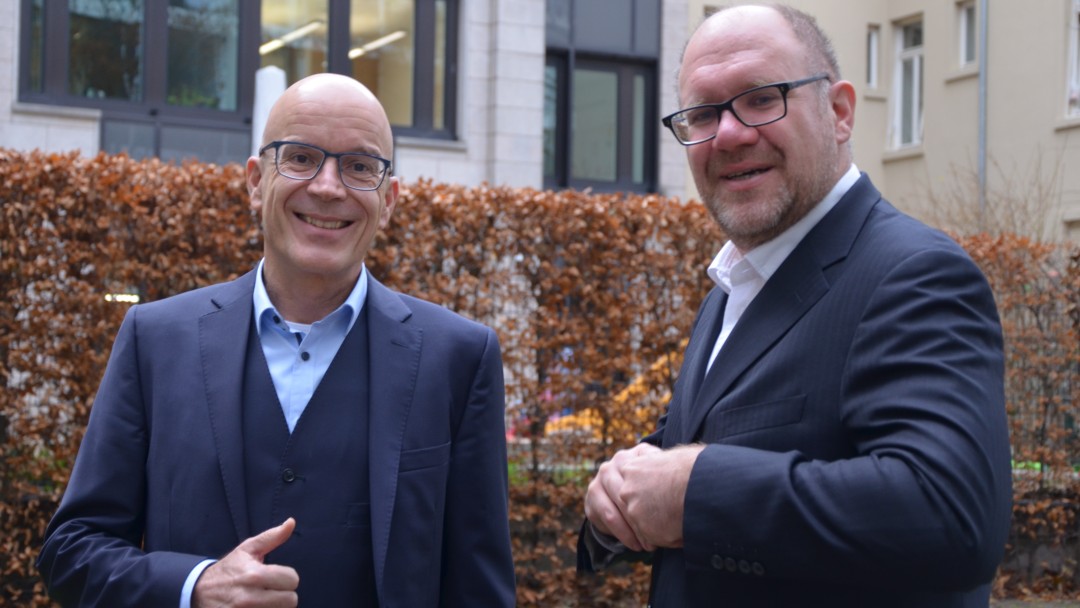
In the context of the special initiative on training and employment of the German Federal Ministry for Economic Cooperation and Development (BMZ), KfW Development Bank has founded the Investing for Employment limited liability company. The process was completed in mid-December with the successful entry of the company in the register. The managing directors of the company, Dr Mark Schwiete and Michael Jainzik, explain the reasons for setting up this company.
First of all, very fundamentally: How did the so-called FC Facility "Investments for Employment" come about, what is the background?
Dr Mark Schwiete: The BMZ has launched the special initiative for work and employment. The aim of the special initiative is to allow for qualified training and employment capacities, especially for young people in Africa. By 2035, the continent will have the largest pool of labour in the world. It is an enormous challenge to harness this potential of the rapidly growing population. Every year, there is an additional need for 20 million new jobs. Putting these people into work will not be possible without the private sector. Many African countries have a highly dynamic economy and are interesting for entrepreneurial investment - for example as a manufacturing location. But locally, there are often obstacles that prevent private sector investment and thus the creation of jobs: These can be insufficiently qualified specialists, a lack of infrastructure or underdeveloped markets.
And these obstacles to private sector investment are where the FC facility comes in?
Dr Mark Schwiete: Exactly. There will be demand-driven investment grants for enterprises, chambers of commerce, non-governmental organisations and also government agencies. Applicants will have to explain very precisely how the grants will help to implement a concretely planned investment and create jobs. This is what makes the difference between the special initiative and also the facility on the one hand and the usual FC procedure on the other. In the usual FC procedure, a systemic approach typically aims to improve the overall system, for example in the field of power supply or health care. In the special initiative, very specific investment projects with a very direct link to the labour market are to be promoted.
Michael Jainzik: And that's why the company should think and act consistently. It will be interesting to see where the advantages lie here and how the complementarity to the systemic approach pays off. The special initiative will initially be active in eight countries: Morocco, Tunisia, Egypt, Ethiopia, Senegal, Ivory Coast, Ghana and Rwanda. We expect it to run for five to seven years, and we have applied to the Federal Government for up to EUR 400 million in grants for this period. The capital will be used in the form of a trustee participation by KfW.
And how can interested companies or organisations apply for the funding?
Michael Jainzik: There will be public calls for proposals in each of the countries of activity. The external facility manager - the EU-wide call for proposals is currently underway - will evaluate the applications, which will go through an assessment procedure that will look at the effectiveness of the projects, for example, but also at environmental issues. The selection criteria are clearly defined in advance. We will also cooperate very closely with GIZ.
Can you give examples - what is going to be funded?
Dr Mark Schwiete: This can be infrastructure - access roads, water supply, power supply...but also training workshops or certification laboratories for export standards in specific industries. Ultimately, however, we won't know until the competitions are held and the companies have articulated their bottlenecks.
Michael Jainzik: But the examples show the difference to traditional investment funds: the new facility does not promote the companies themselves, but rather the necessary framework conditions and the qualification of potential employees.
The "Investments for Employment" facility was established in Germany as a limited liability company. This is a novelty for KfW Development Bank - why was this legal form chosen?
Dr Mark Schwiete: It had been clear from an early stage that a legally independent special purpose vehicle was particularly suitable for the project, partly because the facility can pool funds and provide support for a large number of small-scale projects quickly and efficiently. We then examined various options and submitted a proposal to the Federal Government. It was also a novelty for the ministries that a limited liability company would be structured as a self-consuming special purpose vehicle.
You are only interim managing directors of the facility - what structures will the new company use in future?
Michael Jainzik: The management of the facility is currently being put out to tender throughout the EU. Even such a tendering process is not trivial. We expect the contract to be signed in July 2020, but we could not and did not want to wait that long before the facility was launched. So we decided to appoint KfW as managing director until then. We are currently preparing internal processes and work steps and are implementing the first pilot. Some of the KfW offices in the eight countries mentioned are already in the process of hiring the first local staff to support KfW in the facility’s work in the countries of activity.
That sounds like a lot of speed ... Are there any estimates / targets - how many jobs can be created?
Dr Mark Schwiete: The aim of the special initiative is to create 100,000 jobs and 30,000 training places. And for very many people beyond that, working conditions will improve, their income will rise.
Share page
To share the content of this page with your network, click on one of the icons below.
Note on data protection: When you share content, your personal data is transferred to the selected network.
Data protection
Alternatively, you can also copy the short link: https://www.kfw-entwicklungsbank.de/s/enzBXXp0
Copy link Link copied